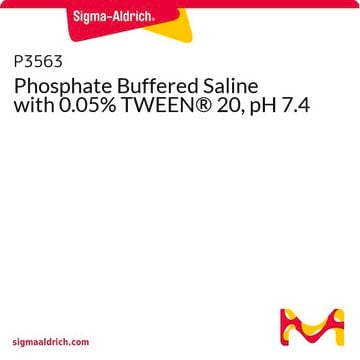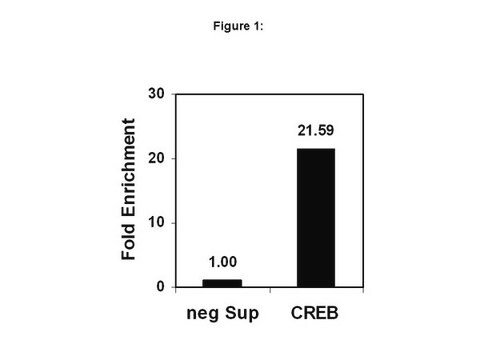MAB979
Anti-Enterovirus 71 Antibody, cross-reacts with Coxsackie A16, clone 422-8D-4C-4D
ascites fluid, clone 422-8D-4C-4D, Chemicon®
Se connecterpour consulter vos tarifs contractuels et ceux de votre entreprise/organisme
About This Item
Code UNSPSC :
12352203
eCl@ss :
32160702
Nomenclature NACRES :
NA.41
Produits recommandés
Source biologique
mouse
Niveau de qualité
Forme d'anticorps
ascites fluid
Clone
422-8D-4C-4D, monoclonal
Espèces réactives
human
Fabricant/nom de marque
Chemicon®
Technique(s)
immunofluorescence: suitable
Isotype
IgG1
Conditions d'expédition
wet ice
Spécificité
Reacts with Enterovirus 71. Neutralizes enterovirus 71 BrCr strain at a titer of less than 1:14.
Immunogène
Epitope: cross-reacts with Coxsackie A16
Application
Indirect immunofluorescence at 1:1,000.
(Also cross-reacts with Coxsackie A16).
Optimal working dilutions must be determined by end user.
(Also cross-reacts with Coxsackie A16).
Optimal working dilutions must be determined by end user.
Research Category
Infectious Diseases
Infectious Diseases
Research Sub Category
Infectious Diseases - Viral
Infectious Diseases - Viral
This Anti-Enterovirus 71 Antibody, cross-reacts with Coxsackie A16, clone 422-8D-4C-4D is validated for use in IF for the detection of Enterovirus 71.
Forme physique
Ascites fluid containing no preservatives.
Unpurified
Stockage et stabilité
Maintain for 1 year at -20°C from date of shipment. Aliquot to avoid repeated freezing and thawing. For maximum recovery of product, centrifuge the original vial after thawing and prior to removing the cap.
Remarque sur l'analyse
Control
Enterovirus Control Slides, Catalogue Number 5066
Enterovirus Control Slides, Catalogue Number 5066
Autres remarques
Concentration: Please refer to the Certificate of Analysis for the lot-specific concentration.
Informations légales
CHEMICON is a registered trademark of Merck KGaA, Darmstadt, Germany
Clause de non-responsabilité
Unless otherwise stated in our catalog or other company documentation accompanying the product(s), our products are intended for research use only and are not to be used for any other purpose, which includes but is not limited to, unauthorized commercial uses, in vitro diagnostic uses, ex vivo or in vivo therapeutic uses or any type of consumption or application to humans or animals.
Code de la classe de stockage
10 - Combustible liquids
Classe de danger pour l'eau (WGK)
WGK 1
Point d'éclair (°F)
Not applicable
Point d'éclair (°C)
Not applicable
Certificats d'analyse (COA)
Recherchez un Certificats d'analyse (COA) en saisissant le numéro de lot du produit. Les numéros de lot figurent sur l'étiquette du produit après les mots "Lot" ou "Batch".
Déjà en possession de ce produit ?
Retrouvez la documentation relative aux produits que vous avez récemment achetés dans la Bibliothèque de documents.
Elizabeth A Caine et al.
Journal of virology, 90(19), 8592-8604 (2016-07-22)
Hand, foot, and mouth disease (HFMD) has spread throughout the Asia-Pacific region, affecting millions of young children, who develop symptoms ranging from painful blisters around their mouths and hands to neurological complications. Many members of the genus Enterovirus (family Picornaviridae)
Rei-Lin Kuo et al.
PloS one, 8(5), e63431-e63431 (2013-05-08)
Induction of type-I interferons (IFNs), IFN-α/β, is crucial to innate immunity against RNA virus infection. Cytoplasmic retinoic acid-inducible gene I (RIG-I)-like receptors, including RIG-I and melanoma differentiation-associated gene 5 (MDA5), are critical pathogen sensors for activation of type-I IFN expression
Ming-Te Yeh et al.
PloS one, 6(11), e27082-e27082 (2011-11-10)
Enterovirus 71 (EV71) has emerged as a neuroinvasive virus responsible for several large outbreaks in the Asia-Pacific region while virulence determinant remains unexplored. In this report, we investigated increased virulence of unadapted EV71 clinical isolate 237 as compared with isolate
Combining multiplex reverse transcription-PCR and a diagnostic microarray to detect and differentiate enterovirus 71 and coxsackievirus A16.
Chen, Tsan-Chi, et al.
Journal of Clinical Microbiology, 44, 2212-2219 (2006)
Programmed cell death of the megagametophyte during post-germinative growth of white spruce (Picea glauca) seeds is regulated by reactive oxygen species and the ubiquitin-mediated proteolytic system.
He X, Kermode AR
Plant & Cell Physiology null
Notre équipe de scientifiques dispose d'une expérience dans tous les secteurs de la recherche, notamment en sciences de la vie, science des matériaux, synthèse chimique, chromatographie, analyse et dans de nombreux autres domaines..
Contacter notre Service technique







